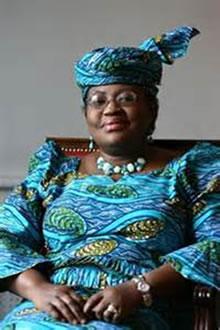
Ngozi Okonjo-Iweala...the West's errand girl...not good value for money in the running and management of Nigeria's economy.
The economy of a country can be defined as a system which tries to balance or manage the available resources which are land, labour, capital and enterprise, against the wants and needs of its consumers(its citizens). In other words, management or proper control of resources is the watchword. It is concerned with three key issues namely:
- What is produced
- How it is produced and
- Who gets(or benefits from) what is produced.
Using the above parameters, we can rightly and with all fairness comment on the state of the Nigerian economy:
WHAT IS PRODUCED
What is mainly produced is oil, which is the main stay of the Nigerian economy. It accounts for about 95% of our foreign exchange earnings and 80% of our budgetary revenues, according to statistical reports, thus making her an economy which produces and depends on only a single product.
Though such an economy is not advisable to run and diversification is required, this is however, not an excuse for the poor state of the Nigerian economy, because there are other countries which depend on oil and gas as we do, but have good resource management and control of the revenues they generate and have diversified their economy through it. Examples are the Middle East oil rich countries which include Saudi Arabia, Qatar, Kuwait, Bahrain and the UAE (United Arab Emirates- Dubai and Abu Dhabi) which have used their oil rich sectors to diversify, develop and sustain other areas of their economy.
Also, in this list are other countries which depend too on single products which are not oil - they are Thailand whose main export is rice, Malaysia and Indonesia- oil palm, Kenyan- tourism, etc.
WHERE AND HOW IS IT PRODUCED?
Oil and gas, the main stay of the Nigerian economy is produced from the country's minute geographical section of the oil fields of impoverished communities of the Niger Delta creeks without regard to the environment and in the deep offshore waters by the oil multinationals. These multinationals continue to operate short of international standards which they are known for, without remedial plans for the environmental impact of their exploration and exploitation activities. This has caused pollution of both land and water bodies, thus greatly depriving the indigenous people of their age-long means of livelihood.
This has created a strong and bitter resentiments on the part of these oil producing communities who feel that they are being exploited and marginalised based on the revenues accruing to the nation from the resources coming from their land which they feel the government is doing nothing about.
WHO GETS OR BENEFITS FROM WHAT IS PRODUCED?
Considering this matter, we see a problem of resource control and management situation, whereby the resources or revenues of the nation circulates within a minute few who are so wealthy that they do not know what to do with it! Instead, it is being consumed on propensities like material acquisition of houses, cars, politicking and other vices, etc.
This has created a vast social divide between the haves and have nots. The middle class is almost non existent as over 80% of the populace live on less than a dollar a day and hardly feels the impact of the government. Statistics have it that 80% of the nation's wealth circulates among 2% of the population. Although, this may be an exaggeration, but it is not far from the truth.
The Petroleum industry bill proposed by well meaning citizens to structure the Petroleum industry, so that the average nigerian worker in the industry can benefit from it,as it is in other well meaning oil producing countries, whose citizens are not treated as second, third or fourth party contract workers or what other exploitative term derived for this, has still not been passed despite years of deliberation on the floor house of the national assembly.
LACK OF VISIONARY LEADERSHIP AND CORRUPTION AS THE REASON FOR POOR RESOURCE CONTROL
The state-owned oil corporation through which the Nigerian government regulates and participates in the petroleum industry (the Nigerian National Petroleum Corporation- NNPC) and from which majority of foreign exchange is derived has been ranked as one of the most corrupt and mismanaged oil corporations in the world with billions of dollars unaccounted for year after year!
Successive regimes have tried to address the issue of resource control and management with some progress which also generates more controversies and shows more clearly how some geographical sections of the nation have been marginalised, thereby threatening the integrity of our nationhood.
A PROBLEM KNOWN IS HALF SOLVED
This setback should not discourage efforts towards addressing this issue. A problem known is half solved. We need to put more efforts by way of dialogue amongst well meaning groups in the country and also for the government to pay more attention to Civil Liberty Organisations and other well meaning non-governmental organisations(NGOs) who are there to checkmate excesses and shortcomings of governmental activities of which poor management of resources is one of them.






